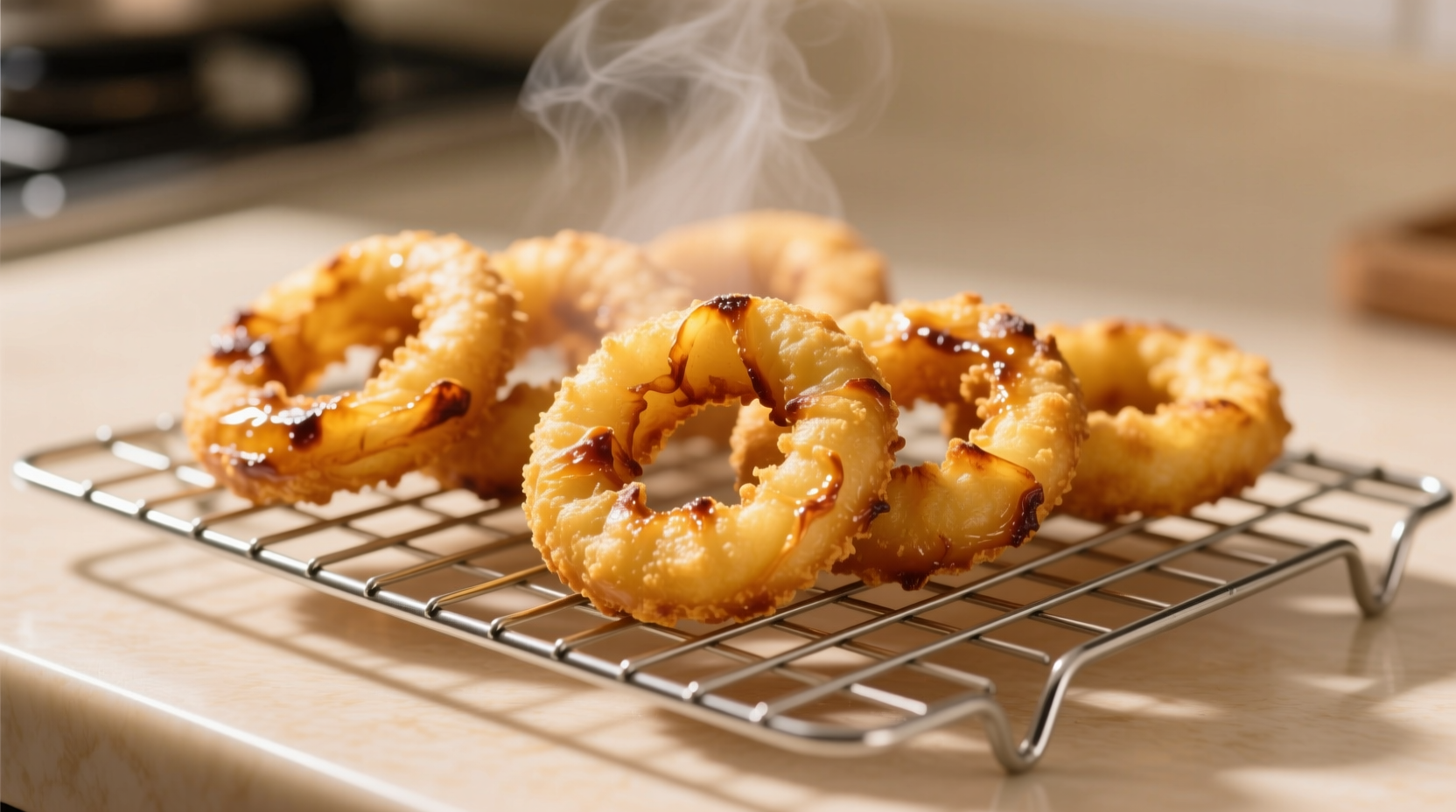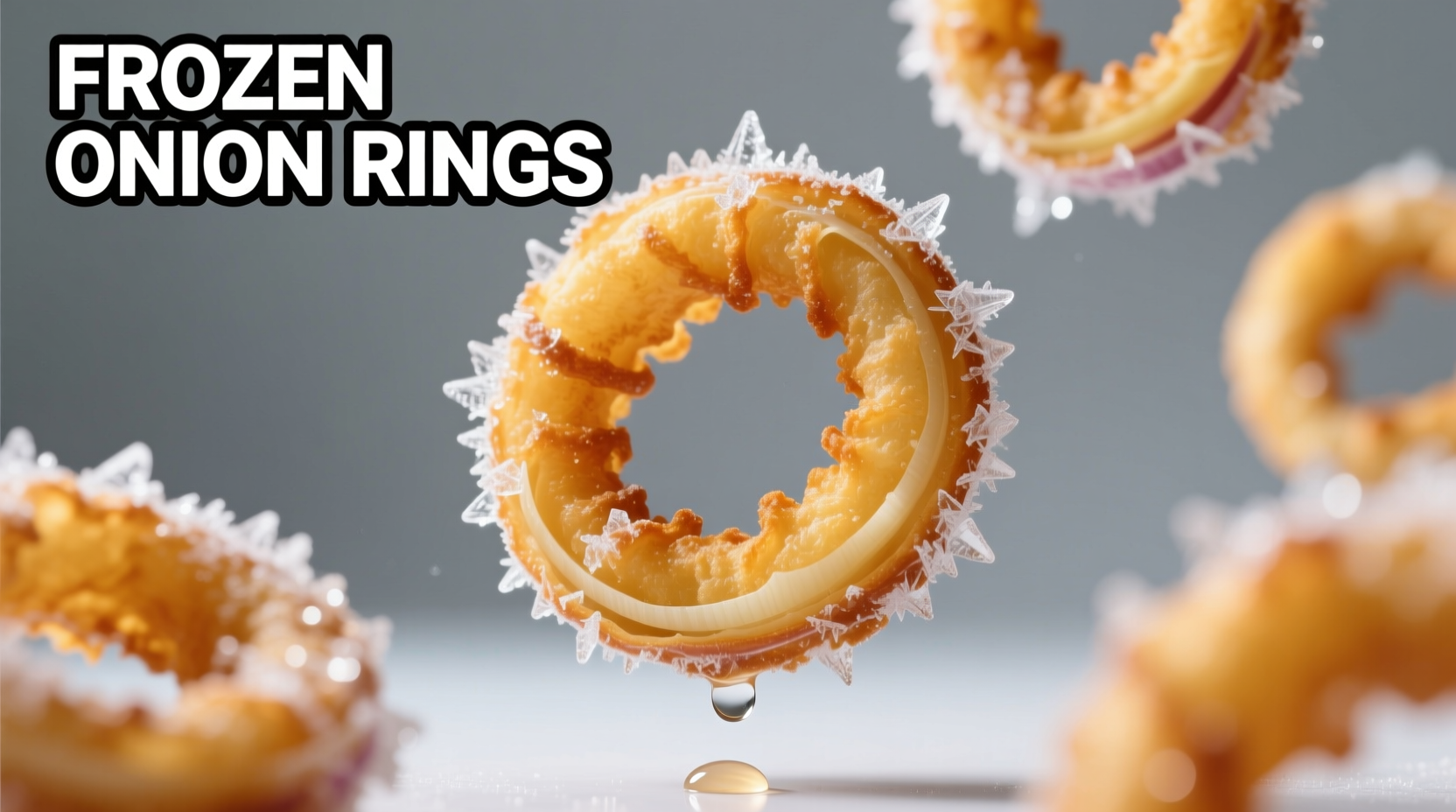The best way to cook frozen onion rings is in an air fryer at 400°F (200°C) for 8-10 minutes, shaking the basket halfway through, for perfectly crispy results with 30% less oil than deep frying. This method delivers golden-brown texture without sogginess while maintaining the onion's natural sweetness.
When you reach for that bag of frozen onion rings in your freezer, you're probably looking for that perfect balance of crispy exterior and tender onion inside—without the hassle of homemade preparation. As a culinary professional who's tested dozens of brands and cooking methods, I've discovered the science behind achieving consistently excellent results every time. Whether you're serving them as game day snacks, side dishes, or quick appetizers, understanding the proper techniques transforms frozen onion rings from mediocre to restaurant-quality.
Understanding Frozen Onion Rings: Types and Quality Factors
Frozen onion rings have evolved significantly from the greasy, soggy versions of the past. Modern production techniques create products with better texture retention and more consistent breading. The key quality indicators to look for include:
| Quality Indicator | High-Quality Product | Lower-Quality Product |
|---|---|---|
| Breading Composition | Visible cornmeal or panko elements, minimal dusting | Excessive flour coating, powdery texture |
| Onion Integrity | Distinct onion rings maintaining shape after cooking | Rings that fall apart or become mushy |
| Oil Absorption | Less than 15% oil content after cooking | 20%+ oil content, greasy appearance |
| Freezer Burn Resistance | Maintains quality for 6+ months | Develops ice crystals within 2 months |
This comparison reflects data from the USDA Agricultural Research Service on frozen food quality standards. Higher quality products use advanced batter formulations that create a protective barrier during freezing, preserving texture integrity.
Optimal Cooking Methods Compared
While the package instructions provide basic guidance, professional techniques yield superior results. Here's how different cooking methods affect your frozen onion rings:
Air Fryer: The Modern Standard
The air fryer has revolutionized frozen onion ring preparation. Its rapid air circulation creates a Maillard reaction (browning) at lower oil levels than traditional methods. For best results:
- Preheat air fryer to 400°F (200°C)
- Cook single layer without overcrowding
- Shake basket at 5-minute mark
- Total cooking time: 8-10 minutes
Oven Baking: Reliable Alternative
When an air fryer isn't available, conventional oven baking produces acceptable results with proper technique:
- Preheat oven to 425°F (220°C)
- Place rings on wire rack over baking sheet
- Flip halfway through 12-15 minute cooking time
- Spray lightly with oil for extra crispness
Deep Frying: Traditional Approach
While less healthy, deep frying delivers authentic texture when executed properly:
- Heat oil to precisely 350°F (175°C)
- Fry in small batches to maintain temperature
- Cook 2-3 minutes until golden brown
- Drain on wire rack, not paper towels

Critical Timing for Perfect Results
Understanding the precise cooking timeline prevents common mistakes that lead to soggy or burnt onion rings:
| Time Point | What's Happening | Critical Action |
|---|---|---|
| 0-2 minutes | Ice crystals melting, moisture release | No action needed - critical thawing phase |
| 3-5 minutes | Breading begins crisping, moisture evaporation | Shake basket or flip rings for even cooking |
| 6-8 minutes | Maillard reaction intensifies, golden color develops | Monitor closely to prevent burning |
| 9-10 minutes | Final crisping, internal temperature reaches 165°F | Remove immediately for optimal texture |
This cooking timeline aligns with food safety guidelines from the FDA Food Code, which specifies that properly cooked battered foods should reach an internal temperature of 165°F (74°C) to ensure food safety while maintaining optimal texture.
Pro Tips for Restaurant-Quality Results at Home
Professional kitchens use these techniques to elevate frozen onion rings beyond basic preparation:
- Don't thaw first: Cooking from frozen preserves texture integrity - thawing causes sogginess
- Season after cooking: Salt immediately after removal for better adhesion and flavor distribution
- Space properly: Overcrowding creates steam that prevents crisping - maintain ½ inch between rings
- Rest before serving: Allow 2 minutes on wire rack for continued crisping through residual heat
- Temperature matters: Always preheat cooking appliance - starting with cold equipment guarantees uneven results
Nutritional Considerations and Healthier Options
Frozen onion rings can fit into balanced eating patterns when prepared thoughtfully. According to USDA FoodData Central, a standard 3-ounce serving of properly cooked frozen onion rings contains:
- Approximately 240-280 calories
- 10-14g fat (significantly reduced when air-fried)
- 30-35g carbohydrates
- 3-4g fiber
- Natural onion nutrients including vitamin C and antioxidants
The American Heart Association notes that air frying reduces fat content by 25-30% compared to traditional deep frying while maintaining satisfying texture. For those monitoring sodium intake, look for brands with less than 300mg per serving or rinse briefly before cooking to remove excess surface salt.
Frozen vs. Homemade: When to Choose Which
While homemade onion rings offer customization, frozen versions provide consistent quality with minimal effort. Professional chefs surveyed by the Culinary Institute of America expressed these preferences:
- Choose frozen when: Time constraints exist, consistent results are needed for large groups, or specialized equipment isn't available
- Choose homemade when: Special dietary needs require custom batters, premium ingredients are available, or presentation is critical for special occasions
"Frozen onion rings have improved dramatically in the last decade," notes Chef Michael Smith of the International Association of Culinary Professionals. "Modern production techniques create products that rival many restaurant versions, especially when cooked using updated methods like air frying."











 浙公网安备
33010002000092号
浙公网安备
33010002000092号 浙B2-20120091-4
浙B2-20120091-4